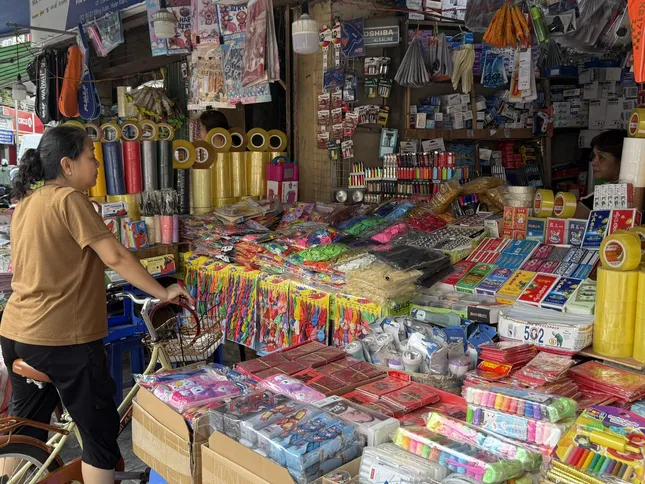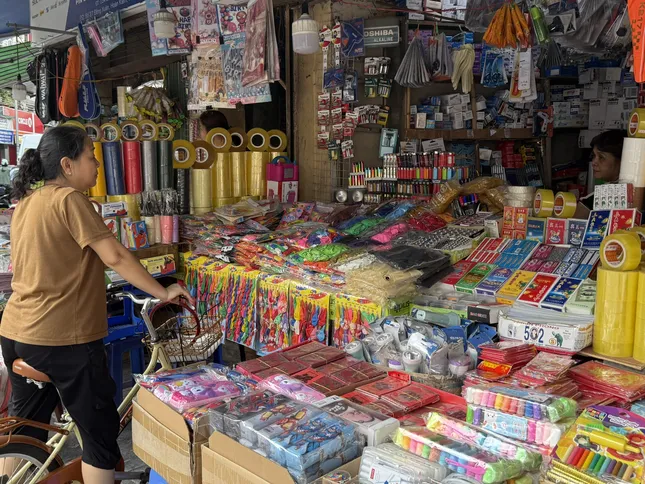A Simplified Bookkeeping System
The upcoming Tax Management Law (replacing the current one) is up for consultation, and with the proposed abolition of the tax quota system from 2026, the Ministry of Finance suggests a new regulation. This includes self-declaration and self-tax payment for business households and individuals, with a direct tax calculation method (a percentage of revenue).
From next year, the tax department will categorize individuals and business households based on revenue. Group 1 includes those with revenue below the taxable threshold (under VND 200 million/year). Group 2 ranges from VND 200 million/year to under VND 1 billion/year. Group 3 is from VND 1-3 billion/year for agriculture, industry, and construction and VND 1-10 billion/year for trade and services. Group 4 is for those with revenue above VND 10 billion/year.
After the tax quota system is abolished, business households in Groups 1 and 2 are encouraged to use electronic invoices. The roadmap for the mandatory use of e-invoices with tax codes or those generated from cash registers for Group 2 is set for 2027-2028.
Meanwhile, Groups 3 and 4 are required to use e-invoices with tax codes or those generated from cash registers for retail sales.

Business households will be categorized based on revenue for appropriate management methods.
In terms of bookkeeping, Groups 1 and 2 only need to record simple income and expenses using templates (software) provided by the Ministry of Finance. Group 3 will follow a simplified accounting regime (amending Circular 88/2021/TT-BTC to focus on modifying accounting templates, simplifying administrative procedures, and reducing compliance costs, time, and effort for business households). Group 4 will apply the accounting regime according to Circular 88/2021/TT-BTC.
In an interview with Tien Phong Newspaper, Mr. Mai Son, Deputy Director of the Tax Department, Ministry of Finance, shared that the tax department has carefully studied and concluded that there is a need to simplify the bookkeeping system based on scale. “In reality, some business households are very large and have clear management needs, while others are small or even micro-scale, requiring more flexible and simpler accounting methods,” said Mr. Son.
Accordingly, the tax department’s view is that bookkeeping and accounting should not only meet tax management requirements but also bring practical benefits to the business households themselves.
“Business households will be able to better manage their operations and, at the same time, help the tax department determine the cash flow, and potentially provide better support for taxpayers, especially in declaration,” Mr. Son added.
“We propose that the development and improvement of the accounting regime should closely follow reality, be classified according to scale and field of operation, and be simplified as much as possible to ensure state management requirements without burdening taxpayers,” Mr. Son emphasized.
Ensuring Stable Livelihoods
The tax department is meticulously preparing for the implementation of electronic invoices and tax management reform for business households, following a simple, accessible, and practical roadmap.
According to Dr. Le Duy Binh, Director of Economica (an economic consulting and research organization), the development of the business household sector needs to be reasonable and well-planned. He emphasized: “Before implementing fundamental and comprehensive solutions, we should not act too strongly, disrupting the livelihoods of millions of business households and people.”
“Business households are very diverse, and we cannot design a single tool for all,” said Dr. Binh, citing an example of households with revenue of about VND 1 billion/year, averaging less than VND 100 million per month.
After deducting input costs such as purchasing goods, renting premises, labor, and utilities, many households are left with less than VND 15 million per month, equivalent to VND 180 million per year. This income includes the owner’s wages and is not considered high.
Dr. Binh suggested categorizing business households into specific groups based on scale, revenue, and readiness, and then developing appropriate roadmaps.

The expert emphasized that business households are diverse, and a one-size-fits-all approach is not suitable.
“Especially for small business households with low income, there should be support, sufficient preparation time, and guidance. Transformation cannot be achieved through administrative orders but through accompaniment, facilitation, and compliance cost reduction,” he added.
“If the policy is designed too strongly and does not match the actual capacity of business households, it will not only cause difficulties in implementation but also worry people and even lead to a mentality of avoidance or withdrawal from the formal sector,” Dr. Binh warned.
Ms. Dang Thi Binh An, an expert from C&A Tax Consulting Company, proposed classifying business households based on revenue to apply appropriate tax rates instead of a uniform mechanism as currently. Regarding inventory issues, Ms. An suggested providing guidance on commodity classification so that business households know how to handle them. Clearly sourced domestic goods should be allowed to continue to be sold, while specific measures should be taken for goods of unclear origin.
At the recent National Assembly session on questioning and answering financial issues on June 19, Deputy Prime Minister Ho Duc Phoc explained some content related to the taxation of business households and the abolition of the tax quota system. He affirmed that abolishing the tax quota system is entirely correct and is reflected in Resolution No. 68.
However, the Deputy Prime Minister suggested that the Ministry of Finance should research and advise competent authorities on tax quota regulations based on taxable revenue levels. This would benefit poor households and small traders and ensure people’s livelihoods.
For example, for small business households with revenue below VND 1 billion, a tax quota system is more suitable. If they issue invoices, they will be at a disadvantage because they do not have input invoices for tax refunds. This affects the poor and disadvantaged.
In a report to the Government on the proposed construction of the Tax Management Law (amended), the Ministry of Finance assessed that abolishing the tax quota system could lead to the risk of some small business households having to cease operations due to failing to meet new requirements. This is especially true for businesses owned by women, ethnic minorities, or the elderly, who may have limited technological capabilities.
“Small Business Owners and Tax Queries: Do I Need to Issue Invoices for My Market Stall?”
As of 2026, the implementation of electronic invoicing and tax declaration based on actual revenue for businesses will be stricter. However, many individuals are unsure whether small-scale trading activities, such as selling a handful of vegetables or fish at the market, require mandatory declaration and invoicing.
“Issuing Invoices for 3,000 VND Noodle Packages: Why Not Simplify the Declaration Process? What’s the Tax Office’s Take on This?”
“On June 17, in an exclusive online interview session hosted by VnExpress, representatives from the Tax Department and related units addressed queries pertaining to tax policies for business households. The informative session aimed to provide much-needed clarity on tax-related matters, offering valuable insights to concerned citizens.”
Cashless Day 2025: ACB and Over 120,000 Customers Embark on a Digital Journey
“Cash is quickly becoming a thing of the past.” At the 2025 Cashless Day event, ACB left its mark with an impressive experiential booth and a synchronized campaign across online and offline channels. The bank’s livestream garnered over 10,000 views, while the event itself attracted more than 120,000 attendees. ACB has once again proven its commitment to accompanying its customers on their digital transformation journey.
The Tasty Turnover: How a Live Seafood Venture Reeled in Half-a-Billion Dong
As of December 2024, Vietnam’s Ministry of Finance reported a total of 3.6 million business households and individual business operators. This significant number showcases the thriving entrepreneurial spirit within the country, with a vast network of small businesses forming the backbone of Vietnam’s dynamic economy.
Why Are So Many Businesses Closing Down?
“A curious coincidence occurred as multiple businesses abruptly ceased trading, coinciding with a swift and comprehensive crackdown on illicit activities by enforcement agencies, targeting contraband, commercial fraud, and other violations.”














































